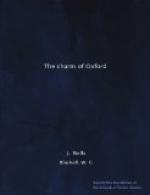The importance of Christ Church is especially seen in its hall, through its collection of portraits. It is not only that this is superior to that of any one other college; it may well be doubted if the combined efforts of all the colleges could produce a collection equal to that of Christ Church in artistic merit, or superior to it in historical importance. The prime ministers of England, of whom Christ Church claims twelve (nine of them in the last century), are represented among others by George Grenville, the unfortunate author of the Stamp Act, George Canning, who called “the New World into existence to redress the balance of the Old,” and W. E. Gladstone; among the eight Christ Church men who have been Governor-Generals of India, the Marquess Wellesley stands out pre-eminent; Christ Church has sent five archbishops to Canterbury and nine to York; there is a portrait in the hall of Wake, the most famous of the holders of the See of Canterbury. Lord Mansfield’s picture worthily represents the learning and impartiality of the English Bench. But even more interesting than any of those already mentioned are the portraits of John Locke, who was philosopher enough to forgive Christ Church for obeying James II and expelling him, of William Penn, presented, as was fitting, by the American state that bears his name, of John Wesley and of Dr. Pusey, whose names will be for ever associated with the two greatest of Oxford’s religious movements. And it may well be hoped that C. L. Dodgson ("Lewis Carroll”) will delight children for many generations to come, as he has delighted those of the last half-century, by his Alice and her “Adventures.”
An interest, rather historical than personal, attaches to the group portrait that occupies a position of honour over the fireplace; it represents the three Oxford divines—John Fell (already mentioned), Dolben, who later was Archbishop of York, and Allestree, afterwards Provost of Eton, who braved the penal law against churchmen by reading the forbidden Church Service daily all through the time of the Commonwealth.
Nowhere, so much as in Christ Church, is the poet’s description of Oxford appropriate; her students may:
“Stand, in many an ancient
hall,
Where England’s
greatest deck the wall,
Prelate and Statesman,
prince and poet;
Who hath an ear, let
him hear them call.”
[Plate XIX. Christ Church : The Hall Interior]
CHRIST CHURCH (3) “TOM” TOWER
“Those twins of learning, which he raised in you,
Ipswich and Oxford, one of which fell with him;
The other, though unfinished, yet so famous,
So excellent in art, and still so rising,
That Christendom shall ever speak his virtue.”
SHAKESPEARE, Henry VIII.
Oxford is described by Matthew Amold as,
“Beautiful city, with her dreaming spires,”




